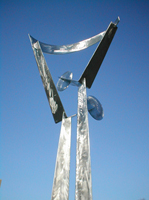
Bryn Mawr College

 |
Center Bryn Mawr College | 
|
22 July 2003
Toulmin's Return to Reason
Additions, revisions, extensions are encouraged in the Forum.
Attending: Xenia Morin; Paul Grobstein: Anne Dalke: Sam Glazier; Judie McCoyd: Roland Stahl
Judie shared that Corey has gotten confirmation by Kate Stimson and Belenky and Clinchy to be speakers. Corey and Liz will be encouraged to send a full update to the GIF group as well as setting up a working group meeting.
Sam shared her frustration with Toulmins writing style and his assumptions of large breadth and depth of knowledge, as well as use of rhetorical questions, that led her to feel that she mistrusted his conclusions and was frustrated with reading him. She astutely noted that for an author who castigates an over-reliance on theory over practice, he wrote a very theorized and abstract book.
Discussion ensued about how scientists approach the benchand feel comforted generally by the idea of a strong theoretical framework for the work they intend to do. Judie acknowledged that in SW we teach that one must have a case theorized before work (practice) with a client begins, but how the reality is that most good clinicians function more from their gutand theorize after-the fact- essentially starting with practice rather than starting with theory. Paul asserted The fountainhead of all theory is the gut, but Anne challenged, wondering if, in fact, Theory is separate from the gutand Skills that may combine to make Practice. This idea that skill and gut are Practice related and that theory derives elsewhere was seemingly accepted by most. This was particularly true for those who approach the bench (lab) with good hands.
Other examples of needing to practice without (or with minimal) theory were raised such as bike riding and reading (though the latter involved some degree of controversy about how theory informs the ability to teach reading).
We became intrigued with the quote from 214, identified by Anne, that Our first intellectual obligation is to abandon the Myth of Stabilityand we spent time exploring what this means in terms of the development of new stories (theories) to explain phenomena, but also how this is the only way that new and multiple theories can develop and be tested for accuracy. Although all agree that there is no master narrative or universal theory that explains all, the role of academia may be to continue to search for just such a theory- as evidenced by the history of looking to math and physics as having the models that are explanatory. The use of evolution as a model applied to all was also raised as a potential form of looking for grand narrative/ theory. It was then suggested that humanists and social scientists may look for the eccentric and different, while natural scientists may look for the contingent universals. The inconsistent thing is what interests social scientists and humanists, while the science community prefers not to have too many inconsistencies (< 5%).
The dichotomy of quantitative vs. qualitative methods, recognized as false nonetheless, was raised as a possible mechanism for the distinction between the 2 branches- that hardsciences start with theory and use data to confirm or refute; qual tends to look at data and expect theory to emerge from it. The question of how a retreat to the mean (revert to average) trend interacts with outlier identification was raised, though with few suggested answers.
A related conversation suggested that outliers raise the need for new stories, with the idea that possible disciplinary forces identified by Toulmin, and particularly, longevity and respect in a particular discipline may lead to a tendency to preserve old stories rather than continue to look for new ones. The idea that most storiesthat are based in math and physics continue to be accepted because they workwas then explored to tease apart the idea that they work for simple phenomena, but complex phenomena have remained somewhat intractable to these concrete explanations.
This raised the issue of universal anxiety about uncertainty and how this plays a role in promoting certitude of storiesas theorized first and tested with scientific method to create certainty. A beginning discussion of the difference between experience and experiment (pps188-9) occurred, but Rolands entrance changed focus.
Roland shared his expectation that the science people might find Toulmins conclusions offensive as they are so contextual, post modern and uncertain and was surprised that that was not the initial reaction. He reiterated the books central point of balance between theory and practice. There was discussion of the changes in the scientific community and its premises, including the fact that older scientists may indeed find Toulmins book heretical, but contemporary scientists find it less so because of a recognition of uncertainty and complexity.
The distinction between the culturewas again raised with the possibility that adding normative or meaning laden content and context is what moves the knowledge building effort from the realm of hardscience to humanist and social science realms. This led to an intense discussion of the meaning of intentionality, futurables, free will and meaning that was relatively unresolved. Anne suggested Everything that is, means,and means to be. Paul argued that Evolution created/s everything that is, and therefore, all that is, has the intention of the process inherent within, even if it is not individually intentioned (Oaks growing from acorns).
It was agreed that another meeting with this book as topic would make sense- scheduled for August 26 (Tues) 12-2 at GSSWSR.
[an error occurred while processing this directive]